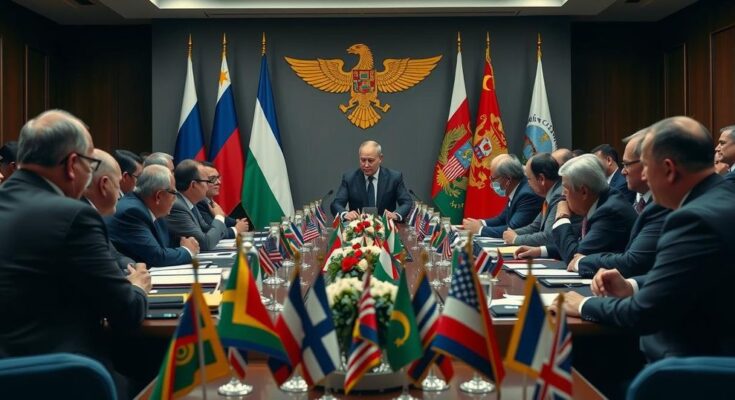Vladimir Putin hosted a summit of 36 world leaders from Brics nations, aimed at showcasing Russia’s global position amid Western ostracization and the ongoing conflict in Ukraine. Attendance included major allies like China and India, with discussions focusing on economic cooperation as a counterbalance to Western dominance. However, ideological differences among members could challenge the coalition’s unity and objectives.
President Vladimir Putin of Russia hosted a summit in Kazan which attracted an impressive attendance of 36 world leaders, highlighting Moscow’s desire to project itself as anything but isolated despite ongoing geopolitical tensions. The participating nations included major powers like China, India, and Iran, as the Brics group continues to expand its influence in the global landscape. Notably, the summit marks the largest international gathering overseen by Putin since the onset of the Ukraine conflict in February 2022. Among the distinguished attendees were Xi Jinping, President of China, and Narendra Modi, Prime Minister of India, with whom Putin held significant bilateral discussions. The event’s scale underscores Russia’s ambition to assert that this coalition represents a significant portion of a ‘new global order.’ The Brics group, originally comprising Brazil, Russia, India, China, and South Africa, has recently included countries such as Egypt and the United Arab Emirates, with ongoing interest from nations such as Turkey and Saudi Arabia. Amidst these discussions, there remained uncertainty regarding the attendance of UN Secretary-General António Guterres, whose involvement could challenge Western positions regarding the conflict in Ukraine. The potential for Guterres’s attendance was met with unclear assertions from his spokesperson, positioning the summit as a pivotal moment for international diplomacy. The Brics group’s goals include counterbalancing the dominance of Western economies and creating alternatives to reliance on the US dollar, perceived as a tool for exerting political pressure. Iranian President Masoud Pezeshkian perceptively remarked, “Brics can be a way out of American totalitarianism and create a path of multilateralism.” This sentiment reflects a broader desire among members to build avenues for collaboration that can resist Western sanctions and influence. However, the swift expansion of Brics comes with inherent risks of diluting collective ideological cohesion, as differing intentions among member nations could blur the group’s purpose. Notably, Brazilian President Luiz Inácio Lula da Silva emphasized that Brics is “not against anyone,” indicating a more inclusive framework than might be anticipated based on anti-Western rhetoric. Analyst Alex Gabuev stated that the summit serves to reinforce the narrative that Russia remains a vital player on the global stage, countering its ostracization by the West. He stated, “Not only is [Russia] far from being an international pariah but also is now a pivotal member of a dynamic group that will shape the future of the international order.” Collectively, the event reflects Russia’s positioning in an increasingly multipolar world, bolstered by potential shifts in global politics, including the possibility of Donald Trump returning to the presidency and a general war fatigue within Europe. The future trajectory of the Ukraine conflict remains tied to these evolving dynamics, as past experiences indicated Russia’s geopolitical maneuvers would influence the likelihood of dialogue versus continued escalations. As Brics expands and asserts that it is focused on economic cooperation rather than security issues, its substantial combined GDP, surpassing that of the G7 or EU, does not necessarily translate into significant influence within financial institutions like the International Bank for Reconstruction and Development, underscoring the challenges this coalition will face in the years ahead.
The Brics coalition, initially composed of Brazil, Russia, India, China, and South Africa, aspires to strengthen economic ties among emerging economies and provide a counterbalance to Western dominance, particularly that of the United States. The grouping has attracted additional members and applicants seeking to join, reflecting a desire among many countries to diversify their economic partnerships and assert their independence from US influence. This summit is significant, occurring amidst heightened tensions due to Putin’s perceived war criminal status denoted by the International Criminal Court and the ongoing conflict in Ukraine. The gathering also illustrates the complexities within Brics as member nations navigate their individual interests while attempting to maintain a unified front.
The Brics summit in Kazan serves as a key diplomatic event, emphasizing Russia’s efforts to project its relevance on the international stage while counteracting isolation due to Western sanctions and geopolitical tension. Although the coalition aims to provide a platform against Western economic hegemony, internal divergences among member states present challenges to its coherence and effectiveness. The outcome of discussions held at this summit could signal shifting global alliances, especially in terms of how countries negotiate their positions regarding the Ukraine conflict and their economic affiliations.
Original Source: www.theguardian.com




